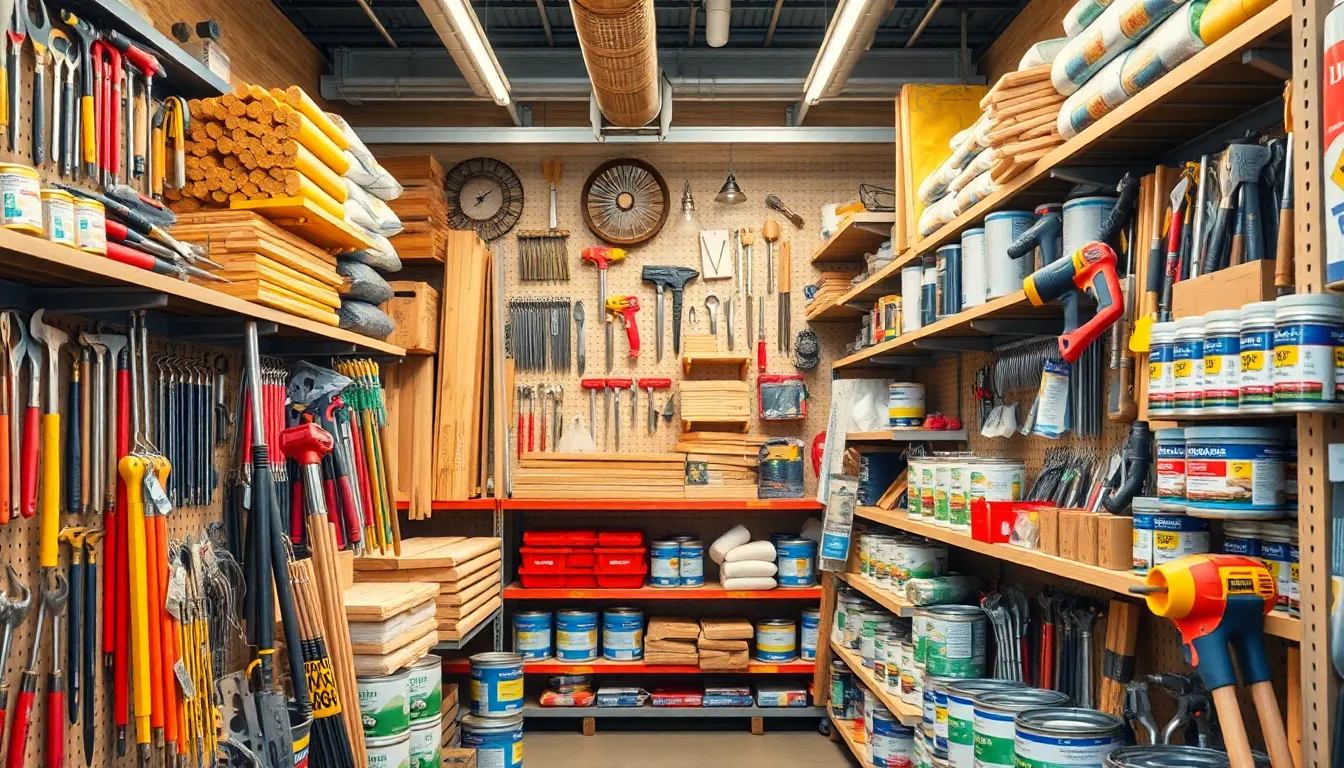Walking into a hardware store is like stepping into a treasure chest for DIY enthusiasts. It’s a wonderland filled with tools, gadgets, and enough fasteners to make anyone feel like a professional builder. Whether they’re tackling a weekend project or simply fixing that leaky faucet they’ve been ignoring, the local hardware store has everything they need to unleash their inner handyman—or handywoman.
Table of Contents
ToggleOverview of Hardware Stores
Hardware stores serve as essential hubs for DIY enthusiasts and professionals alike. They offer a wide range of products including tools, fasteners, and building materials. These stores cater to various needs, from home repairs to large construction projects.
Customers often find everything needed for tasks, such as plumbing, electrical work, and woodworking. Quality tools from reputable brands alongside everyday essentials make hardware stores indispensable.
Staff members typically possess extensive knowledge and can provide valuable advice about product selection and usage. Many local hardware stores often create a sense of community, hosting workshops or demonstrations that educate customers. This fosters a supportive environment for novice and experienced DIYers.
Ranges of services frequently include key cutting, paint mixing, and tool rentals. These tailored services enhance customer satisfaction and encourage repeat visits.
Products offered span various categories like lawn care, plumbing supplies, paint, and electrical components. Shoppers can find specialty items integrated into a broader inventory.
Accessibility contributes to their popularity; most hardware stores are conveniently located in neighborhoods, making it easy for residents to access necessary supplies quickly.
Visiting a hardware store turns into a rewarding experience where customers discover solutions to their projects. Engaging displays often allow shoppers to visualize potential applications of the items they purchase, making the experience even more satisfying.
Types of Products Available

Hardware stores offer an extensive range of products catering to various DIY and professional needs. Customers find diverse categories, each providing specialty items that empower their projects.
Tools and Equipment
Quality tools and equipment establish the foundation of any project. Hand tools like hammers, wrenches, and screwdrivers ensure precision and control. Power tools including drills, saws, and sanders add efficiency to tasks. Specialty tools for plumbing or electrical work cater to specific trades. Brands such as DeWalt, Makita, and Ryobi often populate shelves, ensuring reliability. Availability of tool rentals allows customers to access high-end equipment without high costs.
Building Materials
Building materials form the backbone of any construction project. Lumber, drywall, and concrete are readily available for framing and finishing projects. Various types of insulation help improve energy efficiency in homes. Additionally, hardware stores stock roofing materials and siding options for exterior enhancements. A range of adhesives and sealants ensures durability in applications. Customers also discover items like cement, gravel, and paving stones for landscaping needs.
Home Improvement Items
Home improvement items enhance livability and aesthetics. Paint and finishes offer choices for transforming interior and exterior spaces. Lighting fixtures provide options from basic to decorative solutions, brightening any room. Additionally, flooring materials like tiles, laminate, and vinyl cater to diverse styles and budgets. Plumbing supplies such as faucets, pipes, and fittings support efficient water systems. Customers also find storage solutions like shelves and bins to keep spaces organized and functional.
Customer Experience at Hardware Stores
Visiting a hardware store offers an enriching experience for DIY enthusiasts and professionals alike. Customers discover a well-organized environment curated for convenience and accessibility.
Store Layout and Organization
An intuitive layout enhances the shopping experience. Products are clearly categorized, making it easy to locate tools, fasteners, and materials. Aisles are labeled to guide customers efficiently. Featured sections often highlight seasonal items and promotions, encouraging exploration. Clear signage aids in navigation throughout the store. Informative displays showcase new arrivals and popular brands, helping shoppers make informed choices. Overall, this organized approach allows customers to save time and find exactly what they need.
Staff Knowledge and Support
Knowledgeable staff members play a vital role in customer experience. Employees are usually well-trained, equipped to answer questions and provide recommendations. Personalized service creates a welcoming atmosphere. Many staff members have hands-on experience with projects, offering practical tips and insights. Regular training ensures they stay updated on product knowledge and DIY trends. Customers appreciate this expertise, leading to increased confidence during their shopping journey. Support extends beyond transactions, fostering relationships that encourage repeat visits to local stores.
Comparisons with Online Retailers
Shopping at a hardware store offers unique benefits that online retailers can’t match. One major advantage includes immediate access to products, eliminating waiting times for shipping. Various tools and materials can be examined in person, allowing customers to assess quality and functionality. Instant help from knowledgeable staff also enhances the shopping experience, providing expert advice tailored to specific projects. Community engagement is another key aspect; local stores often host workshops and events that foster connections among DIY enthusiasts.
Advantages of Shopping In-Store
One significant advantage of in-store shopping is the tactile experience. Customers can physically inspect items before purchase, ensuring that products meet their expectations. Additionally, receiving personalized service from staff brings tailored recommendations. Impulse purchases often occur as shoppers discover new tools or materials they may not have considered. Access to local knowledge regarding product use or regional availability also stands out. Convenient services such as key cutting or paint mixing offer added value that online retailers cannot replicate.
Limitations of Online Options
Online shopping has distinct limitations impacting the DIY experience. One primary drawback includes the inability to physically inspect products before buying. Returns can also become cumbersome, requiring time and effort to send items back. Delayed shipping creates uncertainty about product arrival times, especially in urgent situations. Limited customer support complicates troubleshooting, reducing accessibility to immediate assistance. Lastly, online retailers often lack local engagement, which detracts from the sense of community found in hardware stores.
Visiting a hardware store offers more than just products; it provides an experience that empowers individuals to tackle projects with confidence. The combination of quality tools expert advice and a welcoming atmosphere creates a unique environment for both DIY enthusiasts and professionals.
Local hardware stores serve as community hubs where people can connect learn and grow their skills. With easy access to a diverse range of supplies and personalized service it’s clear why these stores remain a preferred choice over online shopping. Embracing the hardware store experience not only enhances project outcomes but also fosters a sense of belonging in the community.


